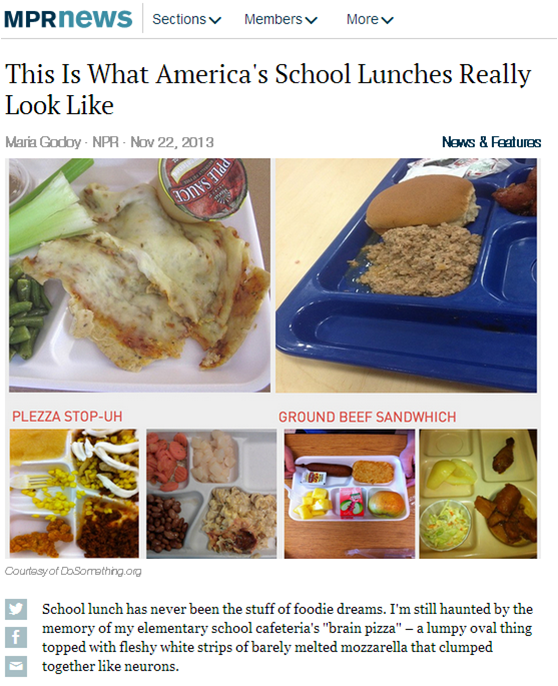The correlation between nutrition, student retention, and academic performance cannot be denied. After all, students need to be well-fed and properly nourished so they can concentrate on their schoolwork. In this connection, NPR senior editor and food blogger Maria Godoy recently wrote about Fed Up, an ongoing project spearheaded by nonprofit campaign manager Farah Sheikh. The project encourages kids to post photos of their school lunches with a view to addressing issues surrounding food quality and portion sizes.
The transformation to more healthful school lunches hasn’t been entirely smooth for school districts. As we’ve previously reported, revamped meals have left some kids protesting smaller portions that leave them hungry — a complaint that also pops up in some of the Fed Up images. That’s one reason why, as school district officials redo lunches, students need to be part of the conversation, says Sheikh.
“We want to give decision-makers a sense of what it’s like to be a student who isn’t getting the energy they need from their school lunch,” she says.
Indeed, while a photo may be worth a thousand words, the Fed Up project extends beyond the visual. Students who submitted images also filled out a survey with questions like: How often do you toss your lunch? How nutritious were the school lunches you’ve eaten over the past four weeks?
School authorities certainly can’t afford to ignore concerns regarding the food they serve. Those in charge of school cafeteria operations and food preparation therefore need to be equipped with the proper instruction and competencies necessary to ensure that students are fed safe and nutritious meals. In this regard, food manager certification in MN can be regarded as a vital component of any successful school lunch program.
Save for a few exceptions–e.g. food carts and establishments that serve 18 or fewer meals at each mealtime—every food establishment in Minnesota, including cafeterias, must have a food manager duly certified by the State Department of Health. Such a professional is responsible for risk management, employee training, daily inspections, and the implementation of safety standards that prevent contamination and the spread of foodborne illnesses.
Training programs by the National Registry of Food Safety Professionals (NRFSP) and ServSafe are considered the gold standards within the food safety industry. An NRFSP and ServSafe MN training provider such as Safe Food Training offers state-approved courses on food preparation and service that empower aspiring certified food managers to maintain the highest level of quality and customer satisfaction.
(Article Excerpt and Image from This Is What America’s School Lunches Really Look Like, MPRnews, 22 November 2013)




